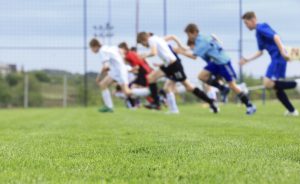There are more opportunities than ever to identify and develop a talented young sports performer. Therefore we provide an increasing amount of strength and conditioning support to youth athletes in recent years. Young clients are often identified as talented in a particular sport and labelled as elite young athletes! Is it possible to be an elite young athlete? Here I discuss the concept of elitism in youth sport. I highlight relevant issues when it comes to strength and conditioning support to youth athletes.
Opportunity knocks for the talented young sports performer

Several factors have conspired to create a huge increase in the number of opportunities for young people to participate and compete in sports:
1. There has been a growth of youth sports leagues.
2. Many National Governing Bodies have developed Talent ID and Development Programmes, some of which include Academies.
3. There has also been a boom in the mount of research pertaining to youth development in sports. Information on talent ID from the former Eastern Bloc nations has helped this.
There is a bigger pool of young athletes to choose from. Sports organisations are identifying more talented young performers. Those picked up are given the chance to access a talent development pathway. These pathways aim at maximising their performance and progress. This includes technical and tactical coaching, along with sports science and medical support. Many of these programmes will provide strength and conditioning support to youth athletes.
Youth development pathways do not net all of the talent
The increased research and investment into youth sport has to have helped with talent development. However, no system is perfect and several people have claimed that the net isn’t cast wide enough. Many systems distinguish young athletes into groups. This is typically done by age. These systems favour those athletes who are older, i.e. born closer to the start date for the age group. Older athletes are more likely to be physical and emotionally more mature. More mature athletes are more likely to perform to a higher level. This relative age effect has been extensively demonstrated in many youth sports. The result is high performance groups that are biased towards early maturing children.
With early maturers gaining more access to talent development pathways, they are subsequently exposed to better coaching. This can widen the gap between them and the late developing athlete. As a result, late developers can become discouraged. They can then drop out from the sport. I have seen this with my own eldest son. A skilful footballer, he has struggled with the increasing physicality of high performance football to the point where it dented his enjoyment of the game.
Strength and conditioning support to youth athletes
Ideally, talent programmes should allow for late developers to come through. However, most selection processes will only select the best available at that particular time. Many talented athletes slip through the net. Chosen athletes are high performers at that moment, and are not elite performers for that sport. It is hoped that with experienced coaching and professional back up, they may become elite performers. However, this is not guaranteed.
Being the best 14 year old in the nation counts for nothing because they are not going to be at the elite level. Young athletes must be coached to trust the process. They must therefore aim to be the best senior performer that they can. This is because these are the ones that get win the contracts.
Strength and conditioning support to youth athletes can play a role in the development of both early and late maturers. Coaches can mistake early maturers as advanced athletes. This can lead to too many training demands being placed upon them. However, the strength and conditioning practitioner can help reign this in by keeping programmes suitable to the athletes training age. Strength and conditioning can help the late developer build confidence and skills. In turn can allow them maximise their biological growth spurt when it occurs.
In my next blog I shall look at how programming the youth athlete shouldn’t be influenced by their level of performance. If you would like more information on how NK Fitness could help your son / daughter then please do not hesitate to contact us. You can do this via our contact form.